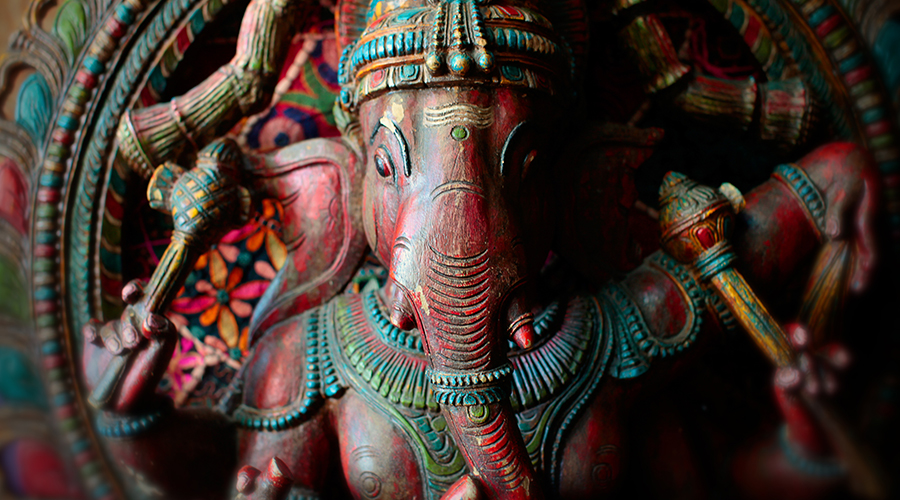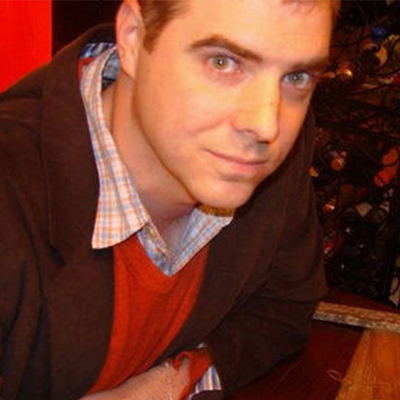
Just like traditional on-campus classes, Penn LPS Online courses emphasize communication and connection with instructors as well as peers. Our courses are designed and delivered by Penn faculty who bring years of teaching experience as well as professional expertise to the classroom. The Faculty Spotlight series aims to introduce you to some of the outstanding instructors who make our courses so immersive and effective. This interview has been edited and condensed.
 Meet Dr. Justin McDaniel
Meet Dr. Justin McDaniel
Justin McDaniel is the Edmund J. and Louise W. Kahn Endowed Professor of the Humanities at Penn, and author of numerous books, most recently Wayward Distractions: Ornament, Emotion, Zombies and the Study of Buddhism in Thailand (2021). His research interests include manuscript studies, literature, art and architecture, material culture, and southeast Asian languages. His PhD in Sanskrit and Indian Studies is from Harvard University.
Justin served as a Buddhist monk in Thailand and Laos, studied Sanskrit in India, and has lived in Nepal, Cambodia, Burma, and Japan during his studies. In his time teaching at Penn, his courses have included Existential Despair, a 7-hour-long weekly seminar, and Living Deliberately, in which students replicate monastic rules including a code of silence. For Penn LPS Online, he teaches RELC 2000: Gods, Ghosts, and Monsters and RELC 2500: Asian Religions.
RELC 2500: Asian Religions is a new addition to Penn LPS Online. What can students expect from this fall 2 course?
Asian Religions looks at Buddhism, Hinduism, Jainism, Zoroastrianism, Taoism, Shinto, and Sikhism. And we touch a little bit on animism and shamanism. So it’s a pretty wide range balanced between east, central, south, and southeast Asian religions, and we look at very pre-modern examples going back to 2000 BCE up to modern practices. It’s a lot. Seven religions in eight weeks, so we don’t waste any time.
Students will get a good basic history of the development of each religion, but what I want most is for them to hear the voices of the practitioners themselves about what it is to practice these religions. I have an interview with three siblings—a Penn undergrad and his two sisters—about what it’s like to be young and professional and Jain, which is a small, highly restrictive religion with about 4 million practitioners in India. I did a video field trip to the oldest Hindu temple in America and interviewed one of the head Brahmin priests, and interviewed a monk at a Thai Buddhist temple very close to it. So if I have any students who happened to grow up in any of these religions, they get to see a different side of it. And if they don’t have any familiarity—you can be a complete novice in this course, it’s an introduction—then they can see how diverse Asia really is. We can’t think of Asia as one place; religious practice in Korea and religious practice in Burma are completely different, and then there’s so much variety of religion within a place like Korea or Japan internally.
Do you draw on any of your personal experiences from living and studying in southeast Asia?
Sure, lots of specific things. I talk about participating in Hindu rituals in north India, funeral rites in Kathmandu, and I talk about meditation and teaching in a Buddhist monastery in Laos. And I’ve gotten a lot of help from students and scholars and practitioners in different places, so it’s not just me teaching the course. I’m bringing their expertise filtered through me.
Is there any benefit to taking classes like this online?
I get to do a lot of creative things online. In Gods, Ghosts, and Monsters, I can take people on video field trips to the Woodlands Cemetery or the Mütter Museum, and then we can have a discussion. I can interview experts on Zoom or in the studio. When class is online, you can have this consistent amount of rich content that doesn’t depend on weather or scheduling.
Why should someone take a religious studies course?
We’re all religious. Whether you believe in religion or not, it affects politics, it effects economics. The world’s first multinational company was the Catholic church. Religion affects the material culture around us: You can’t walk through the city of Philadelphia or Rome or Kyoto or Lagos or Buenos Aires and not see that more than half of the historic architecture and art is religious. The basis of food culture is religious. Skills like botany, early medicine, liquor-making—these are all things that came out of monastic traditions. For most of the world’s history, learning happened in religious settings. The University of Pennsylvania is the only Ivy League school that doesn’t have a chapel—every other one started as a religious institution. The foundation of the humanities is religious, so to have a background in religion helps understand other fields.
The other thing is that we act ritualistically. Whether you’re in a yoga group or SoulCycle, a fraternity or sorority, part of a group for social justice or voter rights or climate change action…. all of these groups have rules. They may take on uniforms, they have mission statements, they have symbols and mottos that they use. So, we act religiously, even if we don’t think we do.
It sounds like religious studies courses can complement a wide range of other studies.
Religious studies is interdisciplinary, certainly. My writing is half textual history—linguistics, philology—and half anthropology and ethnography. But I am also a member of the Art History Department Graduate Group because I do a lot of work in material culture and manuscript studies. That’s not unusual in my department.
That’s why I like working with LPS—the students often have taken nontraditional academic paths. They come to academia with fresh eyes, not a lot of preconceived notions. Any adult who has worked a few years will tell you that they have to use many different skills. Any one major, whether in economics or history or anthropology or real estate or art history, is not going to prepare you for a lot of the dynamic interdisciplinary work that a job would require. So I try to teach courses that would appeal to lots of different people coming from different learning styles and different disciplinary backgrounds.
The discussions become very vibrant, because LPS students are bringing life experience and work experience, but also a deep love of learning. My courses aren’t the most practical courses! You’re taking them because you’re intellectually curious. So I get a lot of very curious, intellectually dynamic students.
Are there any ways you’ve heard of students pursuing practical applications of religious studies in their daily lives, though?
Yes, lots of different things. I had a student who was the educational director of a museum for children, and she felt she had a much better understanding of how to develop educational programs to make parents and children from different cultures and religions feels welcome. I had another student who works for a very large theater in New York and wrote a play with religious and ethical struggles, and another student who just had a novel published. What’s been surprising to me in the last ten years is how many students in public health, nursing, medical school, or health policy have come out of religious studies. You really have to have a knowledge of religion if you’re working in the care industry. And law school, too, because you’re dealing with moral debates. I have two students who are both running for mayor in small towns, and they felt that a study of religion helped connect them to voters.
Anything else you want students to know before enrolling in one of these courses?
One of my teachers once told me that religion is not just something you learn about; it’s something you learn from. You see the way people in different times and places have dealt with major life issues, and it makes you think about how you approach basic human questions in different and creative ways.
Religion is, in many ways, a meaning-making exercise. It’s how to make sense of why we’re here, where are we going, what should we do, how do we treat other people. I have so many students who say they want to make a life worth living. That’s essentially a religious question.
RELC 2000: Gods, Ghosts, and Monsters and RELC 2500: Asian Religions can be applied to the Bachelor of Applied Arts and Sciences degree concentration in Literature, Culture, and Tradition. To learn more about the benefits and objectives of this concentration, read the Penn LPS Online feature “Literature, Culture, and Tradition: an online degree concentration for students of humanity.” RELC 2500: Asian Religions can also be applied to the Certificate in Global and Regional Studies; see what else this broad-ranging certificate has to offer in “This is why global and regional studies are important—now more than ever.”
